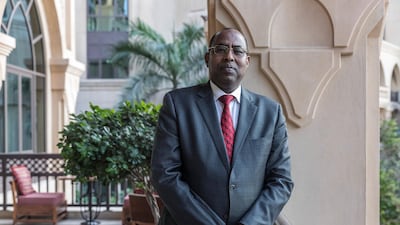The United Nations is seeking the UAE’s support on a humanitarian issue they say has seemingly been “abandoned” by the international community.
As regional crises in Syria, Yemen and South Sudan grip the world's attention, one million Somalis remain internally displaced or forcefully in exiled in refugee camps, 27 years after the country's civil war.
The UN is hoping the UAE and other countries will refocus their support towards the world's most protracted refugee situation.
"It's a refugee situation of a population that has been displaced from their country over the last 27 years living in exile in the sub-region," said Mohammed Abdi Affey, the UN High Commissioner for Refugees (UNHCR) Special Envoy on the Somali Refugee Situation.
“The countries hosting the refugees have a sense of abandonment by the international community because global attention moved to new crises so the Somali population which got displaced continue to be trapped in the refugee camps in the sub-region.”
He said funding to support the population has dwindled over the years.
"We speak now of a shortfall, we only have 15 to 18 per cent of the required budget support, but they need constant attention and support. Initially, we had over 50 per cent but this tells you that there is a fatigue in attention because of other emerging crises that compete for equal attention so the world attention has shifted."
During his three-day visit to the UAE, Mr Affey visited a number of organisations including the Mohammed bin Rashid Al Maktoum Foundation, the Sharjah Research Academy and Human Appeal International in Ajman, all of which have expressed interest in helping.
_______________
Read more:
UN creates role to help refocus aid for Somali refugees
We are working tirelessly to get Somalia on track
_______________
"The UAE is traditionally an important ally and supporter of Somalis," he said. "We are visiting governments, private sectors and organisations - the UNHCR is looking for support from its partners here and elsewhere to meet the needs and expectations of this population, be it scholarships as a complimentary pathway or equipping schools in the camps or in areas of return because education is key."
Although many Somalis are voluntarily returning to their country, Mr Affrey said Somalia is in dire need of improved infrastructure and living conditions to allow sustainable return to take place.
“Somalia is at a ground zero,” he said. “It requires absolute reconstruction for both its population that is returning and the population that is internally displaced.”
Thirty per cent of the Somali population is either internally displaced or forcefully displaced and their return to their country would require schools, hospitals and shelter as well as water, sanitation and livelihood development – all of which require resources.
Refugee camps also need improved facilities such as water, education, food and healthcare.
"These things are all very basic [needs] that people require to be alive and to live in dignity," he said. "The UAE has been very generous towards providing support to refugees and just a few months ago, the UNHCR operations in Uganda benefitted from four million dollars from the UAE to support the refugee population and local population that host them. Resources are critically in need now."
He said Somalia's stability was of global interest.
“It is on the right path and it is beginning to emerge out of civil war but it requires all possible support,” he said.
"The World Food Programme announced a massive cut of food rations to the refugee camps by 70 per cent, which is a big cut, because they're reallocating them elsewhere. Food is the most basic need and these vulnerable people are silently suffering in the camps."
He visited Dr Anwar Gargash, Minister of State for Foreign Affairs, on Wednesday. "The UAE government is a strong supporter of stability in the sub-region and has a long history with the Somali government," he said. "I'm hoping they are now focused on how to make Somalia stronger internally but also towards the displaced population."
Zahra Amir, a Somali sales manager who was born and raised in Dubai, agreed. "It's very good to raise awareness of what Somalis are going through now especially that last month there was a blast in Mogadishu in which many were lost," she said.
Her two brothers still live in Somalia where there is a daily struggle.
“They’re educated and they believe if everyone leaves the country, no one will stay there and bring Somalia back so they’re really fighters and they believe the young generation will take the initiative and fight to get the country back,” she said. “As Somalis we haven’t marketed our case very well so it’s partially on us, our media and our own people who sometimes don’t do the right marketing for this situation. Maybe they support each other but across the globe, people only know that Somalia is where there is piracy and people are very poor and hungry but they don’t know any more of it as a nation, its natural resources and its situation. It was one of the strongest African countries back in the 1970s.”

